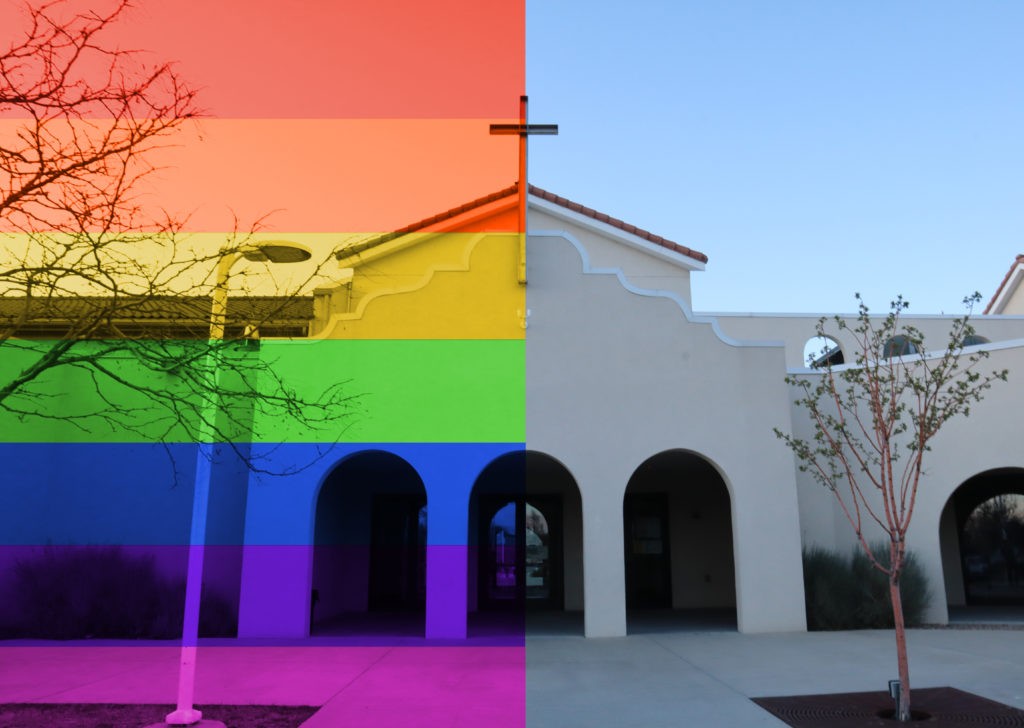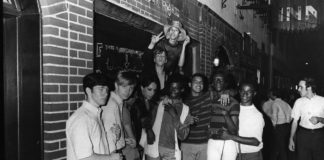
The Catholic Church’s doctrinal authority recently decreed that the Church cannot bless gay marriages because God cannot “bless sin.”
The Congregation for the Doctrine of the Faith, a group of cardinals, bishops and other church officials charged with defending Catholic doctrine since 1542, made this announcement on March 15 in response to questions on whether Catholic clergy are authorized to bless gay unions. The answer from the Congregation was “negative” and an explanatory note was published by approval from Pope Francis.
According to the Associated Press, this statement affirmed the church’s doctrine for same-sex individuals where gay people are welcome in the church, but their unions are not.
Tricia Bruce is a sociologist of religion affiliated with the University of Notre Dame and University of Texas San Antonio who has expertise in Catholicism and social movements. She said because of earlier progressive comments by Pope Francis to the gay community, many Catholics were anticipating a change in position, or perceived the Catholic Church as moving to be more open on its position opposing gay marriage.
The Vatican’s announcement, however, was “ultimately affirmation of what in fact, is the current teaching” of the Catholic Church, she said.
The Catholic Church defends marriage between a man and a woman due to it being instated by God on Adam and Eve during the creation of the world. The Catechism of the Catholic Church states “the union of man and woman in marriage is a way of imitating in the flesh the Creator’s generosity and fecundity.”
In the explanatory note on not blessing same-sex marriage, the doctrinal authority said “it is necessary that what is blessed be objectively and positively ordered to receive and express grace, according to the designs of God inscribed in creation.”
So although the Catholic Church recognizes the valuable, positive elements in same-sex relationships, the church “cannot justify these relationships and render them legitimate objects of an ecclesial blessing, since the positive elements exist within the context of a union not ordered to the Creator’s plan.”
Rising acceptance of gay marriage
Although the Catholic Church, The Church of Jesus Christ of Latter-day Saints and other churches have not changed their positions on gay marriage, acceptance of such unions in wider American society has been rising in the last few decades.
“That’s not to say that there aren’t Americans who disagree vehemently with it, but as a trend, that’s the direction it’s going,” Bruce said.
Part of this change has occurred because of differences between generational values. Bruce attributed this to a generational replacement, where the younger generation’s views start to replace the older generation’s world views and attitudes.
“There’s a real stark divide generationally. Younger Americans are more accepting and open to issues related to homosexuality and gay marriages than older Americans,” Bruce said. “It makes the overall view look, in this case, more liberal or accepting vis-à-vis gay marriage. I think that probably will continue.”
There are still large pockets of resistance to approval of gay marriage, she said, but overall there is a cultural climate saying gay marriage is acceptable. Whenever someone counters that public voice, it seems like they are “entering a firing squad” because it is such a contested sphere.
University of Cincinnati political science professor Andrew Lewis guesses religious bodies will try to be more respectful of gay rights, but “they may not go as far as some gay rights advocates want them (to).”
Lewis said there are individuals who want to support religious freedom and gay rights broadly, but because of current partisanship, “that combination of things is difficult in our political arena to achieve.”
He said when gay rights are expanded in the public sphere, some religious people feel there is a conflict between their faith and what is required of them in the public sphere. That’s how many “end up with these conflicts,” Lewis said.
Despite the rising acceptance of gay marriage, the Supreme Court ruled in favor of freedom of religion in the 2018 Masterpiece Cakeshop v. Colorado Civil Rights Commission case. The prospective future of which rights — gay marriage or religious freedom — will take priority is unclear.
What is freedom of religion?
Religious freedom has been a guaranteed right in the U.S. since the Constitution was established by the Founding Fathers. Freedom of religion secures individuals’ right to practice their preferred religion and also ensures the government cannot force them to adopt any religious faith.
Bruce said colloquially, Americans take pride in being grounded in the separation of church and state, but sometimes the practical implications of the separation of church and state get lost.
Generally, Bruce said Americans should not, and are not, trying to legislate morality through their religious freedom. Individuals, however, have and continue to lobby and advocate for religious freedom as a way “ultimately to be lobbying for and advocating for broader cultural issues,” she said.
University of Tampa sociology professor Ryan Cragun has a sociological emphasis on religion and worldviews. His research focuses on macro and micro factors in The Church of Jesus Christ of Latter-day Saints as well as the growing movement of non-religion.
Cragun said religions in America and around the world, function in a “marketplace.” People who want a religion, can “shop around” and decide which church or institution they want to be associated with.
Religions carve out niches in the marketplace and individuals find “welcome homes” in religions that have similar beliefs. This is validating for those adhering to the religion, Cragun said. It makes people feel like they are not a “weirdo” because those in their faith tradition hold the same beliefs they do.
Cragun said this also means people don’t feel comfortable in a religious institution that doesn’t accept their values. This can cause members to leave a church if changes are made they do not agree with.
Many churches can help people find a “prescriptive vision and articulation of morality” to navigate the difficulties of life, Bruce said. Religions are also seen by many as stabilizing or traditionalizing voices in a rapidly changing world.
Religious freedom in institutions
A debate lies in whether freedom of religion applies solely to individuals or if it also applies institutionally.
Throughout America, various groups differ on the institutional vs. individual interpretation of religious freedom. Cragun said most governments around the world lean toward an individual conception for freedom of religion but America has interpreted freedom of religion both individually and institutionally. He thinks freedom of religion will increasingly be defined at the individual level instead of as something that protects institutions.
Some major religious groups in the U.S. though — the Catholic Church and The Church of Jesus Christ of Latter-day Saints included — interpret freedom of religion to be applied at an institutional level in addition to the individual aspect.
At the institutional level, these churches want freedom of religion to say that they get to have and practice their own beliefs, rituals and policies, Cragun said.
This institutional religious freedom also means churches reserve the right to restrict people from participating in certain rituals or practices. “What this ultimately means,” Cragun said, is he thinks church institutions “can choose to discriminate.”
Churches would never use the term “discriminate” to describe what they are doing and instead believe they are protecting the sanctity of their beliefs, “but functionally, (discrimination) exactly is what’s happening,” Cragun said.
If a religion came out today and said it would not allow Black individuals to participate as full members of the church because that religion sees them as unworthy, “people would lose their minds,” Cragun said. Being Black is not a choice, he said, and therefore that church policy would be “clearly discriminatory.”
The Pope’s explanatory note explains the Catholic Church is not being discriminatory in regards to gay marriage because it is carrying out God’s will.
“The declaration of the unlawfulness of blessings of unions between persons of the same sex is not therefore, and is not intended to be, a form of unjust discrimination, but rather a reminder of the truth of the liturgical rite and of the very nature of the sacramentals, as the Church understands them,” the statement reads.
For most people in the U.S. today, there’s no difference between race and sexual orientation as two aspects of identity, Cragun said. “They see LGBTQ individuals as the exact same as Black individuals. This is not a choice, so if (churches) are choosing to not allow them full participation, even if it’s on the grounds of freedom of religion, then you are using freedom of religion to justify discrimination.”
He said this explains why many leaders in The Church of Jesus Christ of Latter-day Saints continue to emphasize that being lesbian or gay is not a problem because individuals can’t choose if they are gay or not. Individuals can, however, choose whether they act on it.
The Church’s website says, “People who experience same-sex attraction or identify as gay, lesbian or bisexual can make and keep covenants with God and fully and worthily participate in the Church. Identifying as gay, lesbian or bisexual or experiencing same-sex attraction is not a sin and does not prohibit one from participating in the Church, holding callings, or attending the temple.”
Acting on same-sex attraction is the Church’s “fine line distinction,” Cragun said, which makes this issue different from race because there is choice involved. The Church has the ability to restrict full religious membership when it is dependent on the member choosing to live a certain lifestyle, such as participating in homosexual behavior.
The Church also insists that members should treat all people with civility and kindness even if they disagree. “We affirm that those who avail themselves of laws or court rulings authorizing same-sex marriage should not be treated disrespectfully,” the Church said on its same-sex marriage webpage.
In his opinion, Cragun said, “In some ways, the LDS Church is okay with allowing lesbian and gay individuals to have some rights. But it’s still not — I think it’s safe to say — not allowing true equality.”
The Church maintains that because its members choose their personal behavior and lifestyle, anyone who chooses to marry someone of the same sex is responsible for how that choice impacts membership in the faith based on God’s law for marriage, not on academic or societal definitions of “equality.”
Pressure to change
The Catholic Church is “very slow” to change, Bruce said. Because of this, “when it does change, people know. People listen. People hear.”
The Catholic Church, The Church of Jesus Christ of Latter-day Saints and other Christian denominations listen to each other and sometimes even “mirror” each other on policies and stances, Bruce said.
The Catholic Church and The Church of Jesus Christ of Latter-day Saints’ policy positions are “almost exactly the same,” Cragun said. This similarity provides validation on both sides. If the Catholic Church says it isn’t blessing gay marriages, then The Church of Jesus Christ of Latter-day Saints will feel validated in also not sanctioning gay marriage.
If the Catholic Church had said it would bless gay marriages, it could’ve caused many members to leave because they no longer share the same beliefs, Cragun said. Hypothetically, he said this could have “bolstered the ranks” of The Church of Jesus Christ of Latter-day Saints because those who left Catholicism might have joined the Church.
Internal and external pressure for The Church of Jesus Christ of Latter-day Saints to change its policies on homosexual individuals, however, is increasing, he said. “That pressure is there and I’m sure they feel it.”
Because gay marriage is increasingly accepted in America and around the world, Cragun said he believes that pressure will eventually cause The Church of Jesus Christ of Latter-day Saints to change its position on gay marriage.
“I think the pressure is going to get so strong, they are going to have to. That’s gonna be a huge, huge change because of the massive doctrinal implications. I don’t know how they’re going to resolve those, but they’re going to have to,” Cragun said.
In The Church of Jesus Christ of Latter-day Saints, particularly among young members, many don’t agree with the Church’s position on gay individuals, Cragun said. If the Church doesn’t change, he said they could end up alienating young members and more progressive members who believe gay members deserve greater recognition and rights.
“All religions change. They have to adjust to changing social values and morals. It’s just a matter of how far they are going to lag behind,” Cragun said.
Though some academics and scholars may share Cragun’s view, Church leaders have remained firm in the face of increasing societal pressure for such change, and there is no indication in doctrinal and policy statements that such pressure will have any impact. In a document on the Church website from 2015, leaders state definitively that “same-sex marriage will not become a part of Church doctrine or practice.”
The Church’s website explains “changes in the civil law do not, indeed cannot, change the moral law that God has established. God expects us to uphold and keep His commandments regardless of divergent opinions or trends in society.”
The Church believes marriage between a man and a woman is “instituted by God and is central to His plan for His children and for the well-being of society.” Because of this, the Church does not allow Church officers to perform same-sex marriages or any ceremonies associated with same-sex marriages to be held at Church meetinghouses.








